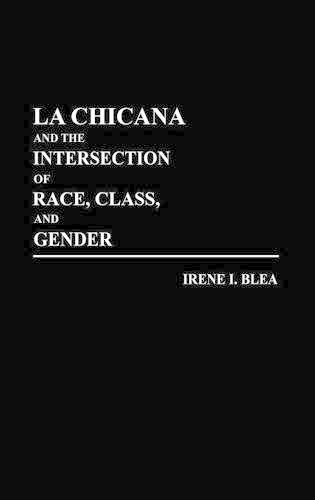
La Chicana and the Intersection of Race, Class, and Gender
(Hardback)
Available Formats
Publishing Details
La Chicana and the Intersection of Race, Class, and Gender
By (Author) Irene I. Blea
Bloomsbury Publishing PLC
Praeger Publishers Inc
11th December 1991
United States
Classifications
Tertiary Education
Non Fiction
Ethnic studies / Ethnicity
Gender studies: women and girls
Migration, immigration and emigration
Civics and citizenship
Racism and racial discrimination / Anti-racism
305.486872073
Physical Properties
Hardback
192
Description
This is a description of the social situation in America of La Chicana, a Hispanic minority female whose life is influenced by racism and sexism. It analyzes contemporary scholarship on race, class and gender, scrutinizing the use of language and labels to examine how La Chicana is affected by these factors. The author explores the history of Chicanas and the meaning of the term "Chicana", and considers her socialization process, the consequences of deviating from gender roles, and the evolution of Hispanic women onto the national scene in politics, health, economics, education, religion and criminal justice. The shared lives of Mexican-American women and men at home and inside and inside and outside of the barrio are also investigated, and the book highlights the variables that effectively discriminate against coloured women. Following a chapter that reviews the literature on Chicanas and focuses on their participation in three major social movements, the text discusses the conquest of Mexico and the blending of Aztec and Spanish cultures. Next, the life of colonial Hispanic women in Mexico and the United States and role of the Mexican War in shaping the Mexican-American experience are investigated. The book then explores how Americanization disempowered La Chicana, discusses women's contemporary cultural roles and their impact on men's roles. Current social issues are compared with those of those of the 1960s, and the final chapters develop a theory of discrimination based on the academic work of racial and ethnic minority scholars and feminist scholars.
Reviews
Blea's political position deserves the respect of the Chicano intellectual community and provides the underlying theme of most of her work. This most recent book reflects Blea's commitment to a Chicano feminism. Blea, author of Toward a Chicano Social Science (CH, Mar' 89), provides the reader with a good introduction to many of the social issues affecting Chicano women today (e.g., teen pregnancy, high fertility rates, role of older women, poverty, school dropouts). Particularly appealing is the author's emphasis on historical events and figures, e.g., Blea's discussion of the role of the Adelitas during the Mexican revolution and of the intellectual legacy of Sor Juana Ines de la Cruz and that of other noted Mexican and Chicano women. Although Blea does an excellent job in bringing to the surface important issues that have been either ignored or not significantly addressed in the social science literature (e.g., violence in humor, dated paradigms, lesbians), she analyzes these issues only superficially. Other minor--but irksome--details are the spelling of the Spanish Dolores as Delores, and the datedness of many of the references. The latter shortcoming is particularly important when discussing contemporary concerns such as health, the elderly, and crime. In sum, the book is recommended as an introduction to the broader topic of Chicano culture and social reality, and to the somewhat narrower topic of Chicano women.-Choice
"Blea's political position deserves the respect of the Chicano intellectual community and provides the underlying theme of most of her work. This most recent book reflects Blea's commitment to a Chicano feminism. Blea, author of Toward a Chicano Social Science (CH, Mar' 89), provides the reader with a good introduction to many of the social issues affecting Chicano women today (e.g., teen pregnancy, high fertility rates, role of older women, poverty, school dropouts). Particularly appealing is the author's emphasis on historical events and figures, e.g., Blea's discussion of the role of the Adelitas during the Mexican revolution and of the intellectual legacy of Sor Juana Ines de la Cruz and that of other noted Mexican and Chicano women. Although Blea does an excellent job in bringing to the surface important issues that have been either ignored or not significantly addressed in the social science literature (e.g., violence in humor, dated paradigms, lesbians), she analyzes these issues only superficially. Other minor--but irksome--details are the spelling of the Spanish Dolores as Delores, and the datedness of many of the references. The latter shortcoming is particularly important when discussing contemporary concerns such as health, the elderly, and crime. In sum, the book is recommended as an introduction to the broader topic of Chicano culture and social reality, and to the somewhat narrower topic of Chicano women."-Choice
Author Bio
IRENE I. BLEA is Director of Hispanic Student Services at the University of New Mexico in Albuquerque. Before she accepted this administrative position, she was a full professor at Metropolitan State College in Denver for eleven years. Her publications include Toward a Chicano Social Science (Praeger, 1988) ssemer: A Sociological Perspective of a Chicano Barrio play and numerous poems.
